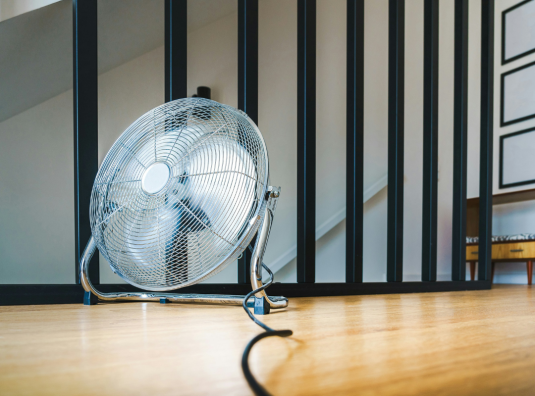The National Oceanic and Atmospheric Administration is predicting a hotter-than-normal summer season across the country. As summer temperatures rise, it can be hard to keep your home cool and comfortable without breaking the bank. Below are some inexpensive ways to keep your home cool during the hot months, as well as tips on what to do during power outages, particularly due to heat waves.
Inexpensive Ways to Keep Your Home Cool
- Use Fans Strategically: Ceiling fans and portable fans are excellent for promoting air circulation. Make sure your ceiling fans are rotating counterclockwise to push cool air down. Fans create a wind-chill effect that makes you feel cooler. For more information on using fans effectively, visit the Department of Energy's guide on fans for cooling.
- Block Out the Sun: Use blackout curtains, blinds or shades to block out the sun during the hottest parts of the day. This can significantly reduce the amount of heat entering your home. Reflective window films can also help in reflecting sunlight away. Learn more about energy-efficient window treatments at Energy Saver.
- Optimize Your Windows: Open windows during the cooler parts of the day, such as early morning and late evening, to allow cool air in. Close them once the temperature starts to rise. This technique, combined with fans, can help maintain a cooler indoor environment. For more tips on natural ventilation, check out this guide.
- Cook Outside or Use the Microwave: Using your stove or oven can heat up your home. Opt for grilling outside or using the microwave, which produces less heat, to prepare meals. For more ways to save energy while cooking and keep your home cool, see this guide.
- Energy-Efficient Lighting: Replace incandescent bulbs with LED bulbs, which produce less heat and are more energy-efficient. More information can be found in the Energy Saver lighting guide.
- Change Air Filters: Replacing or cleaning filters routinely can help keep your AC system running efficiently. You should typically replace or clean air filters every three months — or more frequently if you have pets. Replacing a dirty filter with a clean one can reduce your air conditioner’s energy use by up to 15%, reports Energy.gov.
Preparing for Power Outages During Heat Waves
While some homeowners may be able to invest in a generator, this is not an option for everyone. Here are some tips for both scenarios:
- Benefits of Having a Generator: A generator can keep essential appliances running during a power outage, such as your refrigerator, fans and medical devices. Ensure your generator is installed by a professional and is operating safely outside to prevent carbon monoxide poisoning. Regular maintenance is key to reliable performance. Learn more about the advantages and benefits of having a generator.
- What to Do When You Lose Power Without a Generator:
- Stay Hydrated: Drink plenty of water to stay hydrated. Avoid drinks with caffeine or alcohol, which can dehydrate you.
- Cool Down with Water: Take cool showers or baths to lower your body temperature. Dampening a cloth with cool water and placing it on your wrists, neck or forehead can also help.
- Dress Appropriately: Wear loose, lightweight clothing and stay on the coolest, lowest level of your home.
- Create a Cool Environment: Use battery-operated fans and keep cool packs in the freezer or in a cool, dark place.
- Find Cooler Locations: If your home becomes too hot, consider visiting public places like libraries, community centers or shopping malls that have air conditioning. Many cities will open up cooling stations during a heat wave.
- Use Ventilation: Consider purchasing battery-powered fans to assist in air circulation.
Learn more tips on how to stay cool during a power outage.
Leveraging Your Capital Reserve Account for Significant Expenses
BlueHub SUN mortgages feature a unique component—a Capital Reserve Account designated for unexpected housing costs. This fund is specifically set aside to manage the surprises that homeownership might throw your way. For instance, if you need new gutters or repairs to your roof, this account is designed to help absorb those costs, ensuring financial peace of mind.
If you don’t have a capital reserve account or are unsure, please contact us at 855.604.HOME or info@sunhomehelp.org with any questions.
Watch this video to learn more about the Capital Reserve Account.


